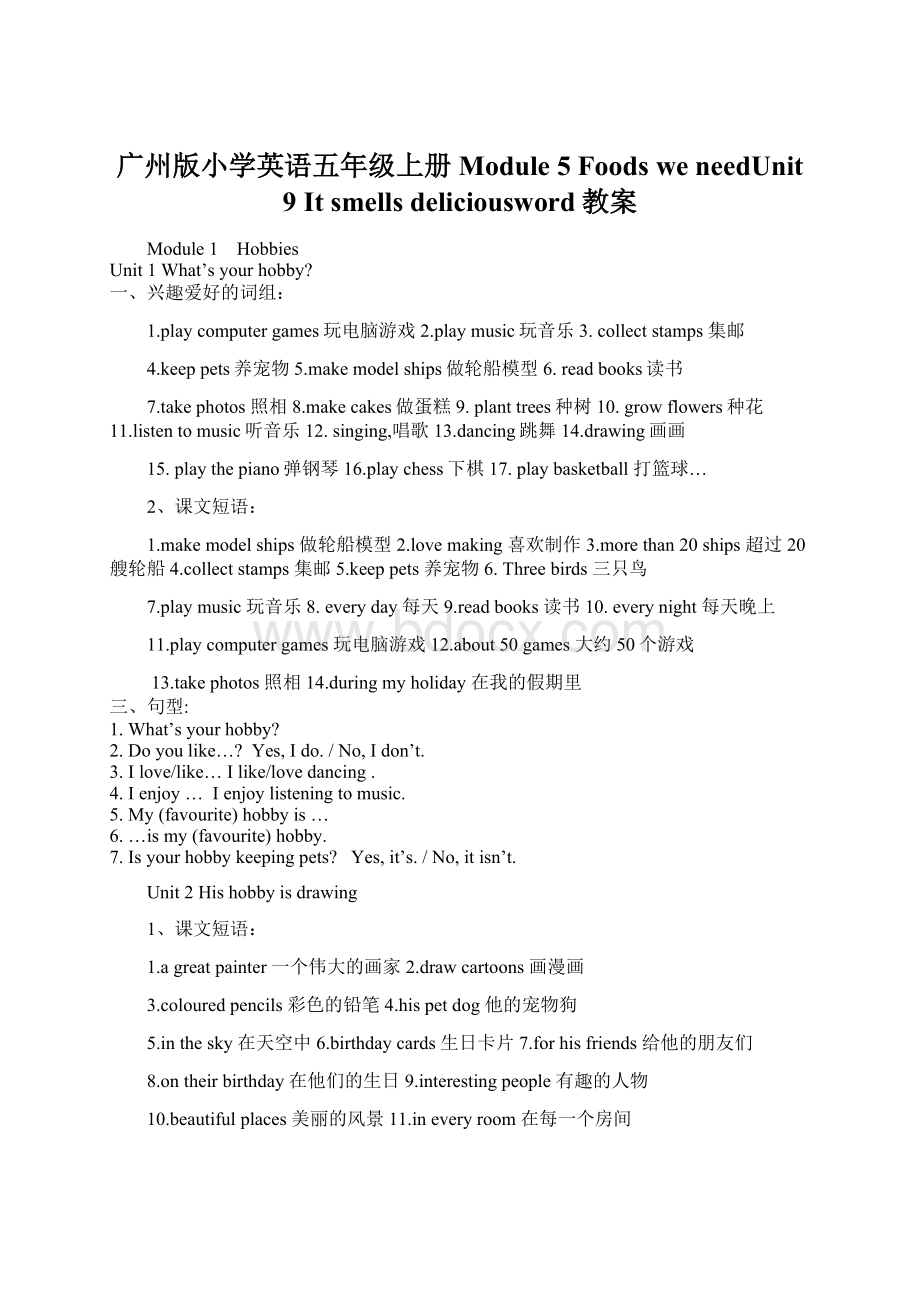 广州版小学英语五年级上册Module 5 Foods we needUnit 9 It smells deliciousword教案.docx
广州版小学英语五年级上册Module 5 Foods we needUnit 9 It smells deliciousword教案.docx
- 文档编号:11842525
- 上传时间:2023-04-05
- 格式:DOCX
- 页数:9
- 大小:22.42KB
广州版小学英语五年级上册Module 5 Foods we needUnit 9 It smells deliciousword教案.docx
《广州版小学英语五年级上册Module 5 Foods we needUnit 9 It smells deliciousword教案.docx》由会员分享,可在线阅读,更多相关《广州版小学英语五年级上册Module 5 Foods we needUnit 9 It smells deliciousword教案.docx(9页珍藏版)》请在冰豆网上搜索。

广州版小学英语五年级上册Module5FoodsweneedUnit9Itsmellsdeliciousword教案
Module1 Hobbies
Unit1What’syourhobby?
一、兴趣爱好的词组:
1.playcomputergames玩电脑游戏2.playmusic玩音乐3.collectstamps集邮
4.keeppets养宠物5.makemodelships做轮船模型6.readbooks读书
7.takephotos照相8.makecakes做蛋糕9.planttrees种树10.growflowers种花11.listentomusic听音乐12.singing,唱歌13.dancing跳舞14.drawing画画
15.playthepiano弹钢琴16.playchess下棋17.playbasketball打篮球…
2、课文短语:
1.makemodelships做轮船模型2.lovemaking喜欢制作3.morethan20ships超过20艘轮船4.collectstamps集邮5.keeppets养宠物6.Threebirds三只鸟
7.playmusic玩音乐8.everyday每天9.readbooks读书10.everynight每天晚上
11.playcomputergames玩电脑游戏12.about50games大约50个游戏
13.takephotos照相14.duringmyholiday在我的假期里
三、句型:
1.What’syourhobby?
2.Doyoulike…?
Yes,Ido./No,Idon’t.
3.Ilove/like…Ilike/lovedancing.
4.Ienjoy… Ienjoylisteningtomusic.
5.My(favourite)hobbyis…
6.…ismy(favourite)hobby.
7.Isyourhobbykeepingpets?
Yes,it’s./No,itisn’t.
Unit2Hishobbyisdrawing
1、课文短语:
1.agreatpainter一个伟大的画家2.drawcartoons画漫画
3.colouredpencils彩色的铅笔4.hispetdog他的宠物狗
5.inthesky在天空中6.birthdaycards生日卡片7.forhisfriends给他的朋友们
8.ontheirbirthday在他们的生日9.interestingpeople有趣的人物
10.beautifulplaces美丽的风景11.ineveryroom在每一个房间
12.inherhouse在她的房子里
二、句型:
1.What’sMike’shobby?
Hishobbyis…
2.WhendoesMikeusuallydraw?
Mike通常在什么时候画画?
Heusuallydraws….
3.WhatdoesMikegivehisfriendsfortheirbirthday?
4.WhatpresentdoesAmygivetoTom?
5.Whatdoesshewanttodowhenshegrowsup?
Shewantstobeawriter.
三、重点精析:
1.growup成长,长大 wanttodo… 想要做…
如:
WhenLucygrowsupshewantstobeanEnglishteacher.
当露丝长大后,她想成为一名英语教师。
当我长大后我想成为一个画家。
______________________________
2.verymuch 非常,很,十分
如:
Mr.Wucanplaythepianoverymuch. 吴先生很会弹钢琴。
Janent很喜欢收集邮票。
___________________________________
Module2 Abilities
Unit3Icanswimveryfast
1、课文短语:
1.begoodatdrawing擅长画画2.drawsverywell画得很好3.readfast读得快4.jumphigh跳得高
5.jumpfar跳得远6.runfast跑得快7.singwell唱得好8.dancewell(舞)跳得好
2、句型:
1.Icanswimveryfast.
2.Whatcanyoudo?
你能够做什么?
Ican…
3.Canherunfast?
Yes,hecan. No,hecan’t.
4.I’mgoodatdrawing.
5.Whatareyougoodat?
你擅长做什么?
三、重点精析:
1.begoodatsth/doingsth 擅长某事,擅长做某事
他擅长画画。
Heisgoodatdrawing.
2.let’s=letus
letsbdosth 让某人做某事
如:
Let’sgoswimmingtogether. 让我们一起去游泳吧。
3.helpsbdosth 帮助某人做某事
如:
Whocanhelpchildrenlearn?
谁能帮助学生学习呢?
4.for 为了
Unit4Canyoudomyhomework?
1、课文短语:
1.happybirthday生日快乐2.beheretohelpyou在这里帮助你3.talkingrobot会说话的机器人4.speakEnglish说英语
5.begoodatmanythings擅长很多东西6.cleanverywell扫得很干净7.writeChineseandEnglish写汉字和英文
2、 句型:
1、Canyoudomyhomework?
你会做我的家庭作业吗?
Yes,Ican. No,Ican’t.
2、WhogivesJiaminapresent?
3、Whatwillhedo?
Hewillbecomeaclown.
4、Whocanhelpme?
三、重点精析:
1、speak+某种语言
如:
CanyouspeakChinese?
2、doone’shomework 做家庭作业
3、talkwithsb 与某人聊天 talkabout 谈论某事
Module3Dailylife
Unit5WhereisBen?
一、课文短语:
1.wantstotalkwithhim想和他谈话2.attheswimmingpool在游泳池里3.goswimming去游泳4.onweekdays在工作日
5.atthelibrary在图书馆6.findhim找到他7.lookforhim寻找他8.inthemusicroom在音乐室9.takeexercise参加锻炼
10.inthegym在体育馆11.doone’shomework做家庭作业12.intheclassroom在教室里13.eaticecream吃冰淇淋
14.attheschoolshop在学校商店里
2、句型:
1.WhereisBen?
Heisattheswimmingpool.
2.Ioftenplayfootballafterschool.
3.Helikesskating.
4.DoesBenoftengoswimming?
Yes,hedoes./No,hedoesn’t.
5.Whatdoyouusuallydoafterschool?
Iusuallydomyhomework.
6.Wheredoyouusuallygointheafternoon?
Iusuallygotothelibrary.
三、重点精析:
1.频率副词:
always总是 usually 通常
often经常 sometimes有时 never 从不
2.doone’shomework 做家庭作业
3.onweekdays 在工作日 attheweekend 在周末
4.playwith 玩,玩弄,和…为伴
如:
Iwanttoplaywithyou. 我想跟你一起玩。
5.lookfor 寻找
如:
Whatdotheylookfor?
他们在寻找什么?
6.stareat 凝视,盯着 while 当……的时候
如:
Whileheisplayingcomputergames,hisfatherstaresathim.
当他在玩电脑的时候,他的父亲盯着他。
7.beafraidofsth./doingsth. 害怕,担心,恐惧
Dave很害怕狗。
Daveisafraidofdog.
8.DoesBenoftengoswimming?
本句中的主语Ben是第三人称单数。
在一般现在时中,当主语是第三人称单数时,谓语动词也要用第三人称单数形式,即在动词原形后面加s或es。
注:
1)人称代词he,she,it是第三人称单数。
如:
ShereadsEnglishbookeverymorning.
2)单个人名、地名或称谓主语时是第三人称单数。
如:
Thedoglikesrunning.
3)单数可数名词或“this/that/the+单数可数名词”作主语时,是第三人称单数。
如:
Ahorseisausefulanimal. Thisbookismine.
4)不定代词someone,somebody,nobody,everything,something等及指示代词this,that作主语时,是第三人称单数。
如:
Someoneisunderthetree. Thisisapen.
5)不可数名词作主语时为第三人称单数。
如:
Themilkisintheglass.
动词第三人称单数形式变化规律:
1)一般动词,直接在词尾加s。
如:
play---plays,want----wants,get----gets,like----likes等。
2)以字母s、x、ch或o结尾的动词加es。
如:
go---goes,do---does,watch---watches等。
3)以辅音字母+y结尾的动词,先把y变i,再加es。
如:
study---studies,fly---flies等。
Unit6 Attheweekend
1、课文短语:
1.attheweekend在周末2.wakeup醒来3.haveabigbreakfast吃一顿丰盛的早餐4.onSunday在周六
5.haveaswimminglesson上一堂游泳课6.gooutforlunch出去吃午饭7.gotothecinema去看电影
8.havesomefun娱乐9.stayathome呆在家里
二、句型:
1.Whatdoyoudoattheweekend?
Ioftenhelpmymotherdothehousework.
2.SometimesTonylikesstayingathomeandwatchingTV.
3.Shealwaysplaystabletennisinthegymafterclass.
4.Doesyourmotheroftengoswimmingattheweekend?
Yes,shedoes./No,shedoesn’t.
三、重点精析:
1.bebusywithsth.忙于做某事 bebusydoingsth.忙于做某事
如:
Sheisbusywithherchildren. 她忙于照顾孩子。
他正忙于做家庭作业。
Heisbusydoinghishomework.
2.wakeup 醒来,唤醒,叫醒
Bequiet.Don’twakeupyourfather.
3.goout外出 gotothecinema 去电影院,看电影
stayathome 留在家里,呆在家里
4.talkwithsb. 和某人聊天
5.introduce 介绍,引进 introducemyself 自我介绍
如:
Letmeintroduceafriendtoyou. = Letmeintroduceyouafriend.
让我介绍给你一个朋友吧。
6.wanttodosth. 想要做某事 wantsb.todosth 想要某人做某事
她的父母向让她学习游泳。
____________________________________
7.mostof+复数名词 大多数的……
如:
mostofus 我们大多数 mostofthem他们大多数 mostoftime大部分时间
8.makesb.+形容词 使某人… makesb.dosth. 使某人做某事
9.havefun=haveagoodtime=enjoyoneself 玩的开心
10.频率副词:
频率副词 词义 大致发生的频率
always 总是 100%usually 通常 80%often 经常 60%sometimes 有时 30%never 从不 0
Module4Foodsanddrinks
Unit7Doyouwantcoffeeortea?
1、课文短语:
1.drink...forlunch午餐喝...2.teawithmilk奶茶3.abottleofjuice一瓶果汁4.aglassofwater一杯水
5.aboxofmilk一盒牛奶6.acupoftea一杯茶7.acanofcoke一罐可乐
二、句型:
1.Doyouwantcoffeeortea?
2.Whatdoyouwanttodrinkforlunch?
Iwantalargecoke.
3.CanIhavealargecoke?
YesyoucanNoyoucannot.
4.Whatisyourfavouritefood?
三、重点精析:
1.abottleof 一瓶… aglassof 一杯… aboxof 一盒…
acupof 一杯… acanof 一罐… abowlof 一碗
2.something+形容词
somethingcold somethingnew somethinginteresting
Unit8Let’shaveboth
1.tomatoandeggsoup西红柿鸡蛋汤2.have...fordinner晚餐吃...3.liketoeatrice喜欢吃米饭
4.worrytoomuch太操心5.eatsoup喝汤6.forstarters作为第一道菜7.startcooking开始煮饭
2、句型:
1.Let’shaveboth.
2.Whatshouldwehavefordinner?
3.Iwantsomesnacks.
4.MyEnglishfriendsenjoybread,sandwiches,hamburgers,andfishandchips.
5.Linglingwillmakeeggsoupforstarter.
6.Theywillhavefishandvegetablesforthemaincourse.
7.Ihopeeveryonewilllikeit.
三、重点精析:
1.both(两者)都
如:
HebothspeaksandwritesChinese. 他既会说也会写中文。
2.liketodosth. 想要做某事 likedoingsth. 喜欢做某事
如:
Iliketoeatfishandpotatoes.
Helikesswimming.
3.enjoysth./enjoydoingsth. 喜欢…./喜欢做……
Jim喜欢冰淇淋。
Jimenjoyicecream 我喜欢吃汉堡包和三文治。
Ienjoyeatinghamburgerandsandwich
4.flyaway 飞走 flyback 飞回 put…into… 把…放进…
againandagain 一次又一次 comeupto 达到,等于
comeback 回来 atlast 最后
Unit9Itsmellsdelicious
一、课文短语:
1.timeforlunch吃午餐时间2.trythechickenfirst先尝尝鸡肉3.Thinkof觉得;认为4.somanythingstotry太多东西可以尝
5.lookfresh看起来很新鲜6.verysweet很甜7.lookquitegood看起来很好8.smelldelicious闻起来很香9.tastesgood味道很好
二、句型:
1.Itsmells/tastes/looksgood.
2.Theyareverysalty/hot/sweet/delicious.
3.Whatdoyouthinkofthefood?
三、重点精析:
1.It’stimeforsth. It’stimetodosth. 是时候……
It’stimeforlunch. It’stimetogetup.
2.healthy健康的 healthyfood 健康食品 health 健康
3.Itsmellsdelicious. 它闻起来很香。
“Itsmells+形容词.”意为“它闻起来……。
”这里的smell是感官动词,意为“闻起来”。
常用的感官动词有look(看起来),taste(尝起来),sound(听起来)等。
如:
Itlooksfresh. Ittastessalty. Itsoundsgreat.
4.Theyareverysalty. 它们很咸。
描述食物或饮料的口味或特征时,常用“Itis/Theyare+形容词.”前面还可以加上very(非常),quite(相当),too(太),so(如此)等。
常用来描述食物或饮料的形容词有:
hot 辣的 sweet 甜的 sour 酸的 salty 咸的
delicious 美味的 good 好的 fresh 新鲜的 healthy 健康的
5.Whatdoyouthinkofthefood?
你认为这食物怎么样?
“Whatdoyouthinkof…?
”意思是“你认为……怎么样?
”后面可跟某人、某物或某事。
也可以用“Howdoyoulike…?
”来表达同样的意思。
Unit10Differenttastes
一、课文短语:
1.differenttastes不同口味2.verydifferent很不同3.intheWest在西方4.onaplate在碟子上5.withaknifeandfork用刀和叉
6.inBeijing在北京7.saltyfood咸的食物8.hotfood辣的食物
2、句型:
1.DoyouknowthatpeopleinChinahavedifferenttastes?
2.Chinesepeopleeatwithchopsticksandbowls.
3.Chinesepeoplelikeeatingriceornoodles,butwesternpeopleearbread.
4.Peopleusuallyeattheirmeatsonaplatewithaknifeandfork.
三、重点精析:
1.different 不同的 bedifferentfrom… 与……不同
如:
Heisdifferentfromhisbrother.
2.plentyof 大量的;很多的 同义词:
lotsof alotof
3.DoyouknowthatpeopleinChinahave
- 配套讲稿:
如PPT文件的首页显示word图标,表示该PPT已包含配套word讲稿。双击word图标可打开word文档。
- 特殊限制:
部分文档作品中含有的国旗、国徽等图片,仅作为作品整体效果示例展示,禁止商用。设计者仅对作品中独创性部分享有著作权。
- 关 键 词:
- 广州版小学英语五年级上册Module Foods we needUnit It smells deliciousword教案 广州 小学英语 年级 上册 Module deliciousword 教案
 冰豆网所有资源均是用户自行上传分享,仅供网友学习交流,未经上传用户书面授权,请勿作他用。
冰豆网所有资源均是用户自行上传分享,仅供网友学习交流,未经上传用户书面授权,请勿作他用。
链接地址:https://www.bdocx.com/doc/11842525.html


 铝散热器项目年度预算报告.docx
铝散热器项目年度预算报告.docx
